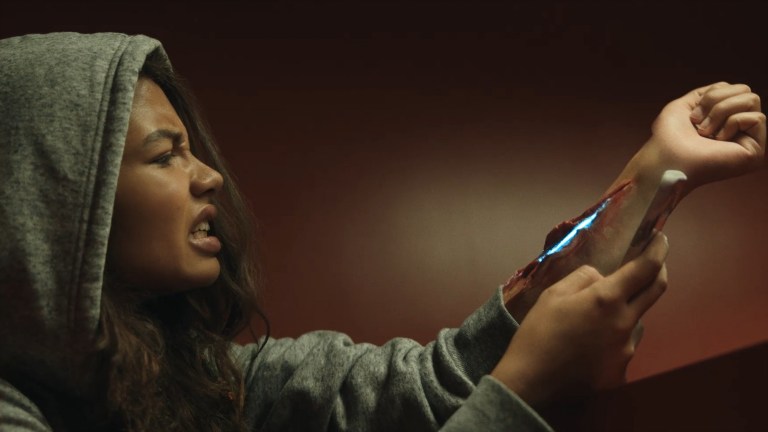Catherine Hardwicke on Don’t Look Deeper’s #BlackLivesMatter Metaphor
Examining the ending of Quibi’s sci-fi thriller series, in both its violence and optimism, through the lens of #BlackLivesMatter.

This contains spoilers for the season finale of Quibi’s Don’t Look Deeper. Content warning for discussion of violence against Black bodies.
As director Catherine Hardwicke told Den of Geek in a recent interview, Quibi’s science fiction thriller series Don’t Look Deeper is a coming-of-age story “on steroids”—that is, it takes the existential questions about identity and power seen in other teenage stories and filters those questions through the metaphor of protagonist Aisha (Helena Howard) discovering that she is a robot. Over the course of the feature-length season (released in 7-to-10-minute episodes), Aisha asserts her autonomy to her human creators, challenges her peers who see robots as nothing more than property, and—most importantly—tries to save her robot brother Calian (Tyler Ghyzel) from a similar fate.
However, while Aisha’s identity as a robot provides the most action-packed stakes for the series, it is not the most important lens through which to view her story. Equally vital to take into account is that she is female, queer, and Black. The latter aspect of her identity especially makes the season finale, which is intended to end on an optimistic and open-ended note, take on a much more disturbing context—especially considering the latest #BlackLivesMatter protests and anti-racism activism that have mobilized the country since June.
While the first half of Don’t Look Deeper concerns Aisha coming to grips with the revelation that she was created by scientist Sharon (Emily Mortimer) and raised by well-meaning father figure Martin (Don Cheadle), partway through the series there is a shift when Aisha remembers that she has a younger brother. Sharon created Calian for her lonely cyborg daughter, who wanted someone who would be just like her; thus her younger brother, whose name means “a warrior of life,” shares her inner hardware and her biracial appearance.
While Sharon had managed to escape with Aisha, they had been forced to leave Calian behind at the tech company where Sharon originally created both of her robot children, with the intention of returning for him once they were safe. Brothers Noah (Kaiwi Lyman) and Abel (Harvey Zielinski) consider both Aisha and Calian property of the company: invaluable patents, intelligent machines, incredibly promising for the future of robotics, but nothing more than that.
This dehumanization of two Black children seems an intentional metaphor for how Black humans are treated in the real world. When Den of Geek spoke with Hardwicke in early June, the George Floyd protests had been going on for a week, making it impossible to ignore this juxtaposition.
“OK, that is fascinating, that’s fantastic,” Hardwicke said when asked if there were a social commentary aspect to the casting choice. “Of course, this was written and conceived and cast a year and a half ago, and at that time we were doing research on what did people think the future of humanity would look like, and so we found all these cool images that would be a mixed-race person, would be the future of humanity. We found images and scientific data, popular scientific magazines that had images that looked something like Helena looks, and so we thought that maybe our scientist [Emily Mortimer’s Sharon] would be thinking that way too, like the future of humanity is going to be genetically diverse.”
While Hardwicke didn’t specify which images they found, it’s likely that they were referring to something like the 2013 National Geographic portrait series that celebrates multiracial diversity and visualizes a future in which there might be fewer limitations in discussing race and biracial people’s experiences.
“That was the reason [for our casting choices] originally,” Hardwicke said, “and then the different level that you’re talking about are—yeah, that is fascinating—because now we hope that you feel from the very beginning that you love her, that you love Aisha, that you’re sympathizing with her; and that you feel her quote-humanity, you feel empathy for her, even though she doesn’t look like every viewer that’s going to be watching. I hope that you really care about this person because we start with her, we end with her. I hope that translates to extending humanity to somebody else, to the ‘other,’ to a person that doesn’t look like you.”
While the creation of the characters comes from a well-meaning attempt to envision a future with less racial prejudice, Don’t Look Deeper unfortunately ends on incredibly violent imagery that more accurately reflects our present state of brutality against Black bodies. After appealing to Abel—who as a trans man understands the dilemma of being someone other than society says you are—to help her reach Calian, Aisha is devastated to get only a few minutes with her brother before they are both taken offline. Despite his sympathies, Abel still sees them as a faulty experiment gone wrong, and activated a computer virus that shut both robots down.
The final episode of Don’t Look Deeper opens on the truly disturbing visual of Aisha and Calian’s bodies being destroyed by a machine, broken down into spare parts, their remains oozing black goo. The tech company has disposed of its supposedly faulty property, and believes that they are rid of their problem. However, Aisha’s ex-boyfriend Levi (Jan Luis Castellanos) and best friend/love interest Jenny (Ema Horvath) discover that Aisha backed up her consciousness with fellow robot William (Brandon Win). When they restore her backup to William’s body, the three make a plan to track down a new body for Aisha. As the final moments of the episode reveal, one of the tech company’s former engineers had fled to China, where he is creating unauthorized copies of the robots—including one with Aisha’s face.
It’s intended as an ultimately hopeful ending, but it follows the aforementioned scene of particular violence against Black bodies. With the final episode airing August 11, while the George Floyd protests and other #BlackLivesMatter protests are ongoing, that story choice cannot exist outside of the current cultural context.
When asked how the ending might be perceived in light of current events, Hardwicke answered, “I’ll probably have a better answer tomorrow when I think about it a little more deeply, but I can see that it is symbolic. It can have resonance to the destruction of lives, of innocent lives that we’re seeing right now, especially a little boy… Both of them are innocents; they didn’t ask to be made, they didn’t ask to be the way they are, and then somebody else feels like they are a danger to society, so they are eliminated. It seems like there can be a lot of parallels.”
Don’t Look Deeper sought to present a queer, biracial protagonist who could be seen as relatable even if she were not an exact mirror image for every single viewer. As Hardwicke said ahead of the series premiere in July, she interprets the series’ title as what not to do, that viewers should challenge themselves to consider what’s beneath the surface, whether it’s about robot identity or systemic racism: “Intellectually we do need to fight that phrase, ‘don’t look deeper’—yes, look deeper; yes, think more deeply; yes, care more,” she said. “Dig into the details and the truth.”
In this case, the truth is complicated: The series had good intentions in its casting and in its metaphorical journey to acceptance for Aisha, including her optimistic second chance at reclaiming the body that was taken from her. But Calian is not offered the same opportunity for a future, and represents an unnecessary casualty both in the world of Don’t Look Deeper and in the real world, where Black people are murdered because they are not seen as human. Unfortunately, the latter loss resonates more than the former win.
Don’t Look Deeper is available on Quibi.
